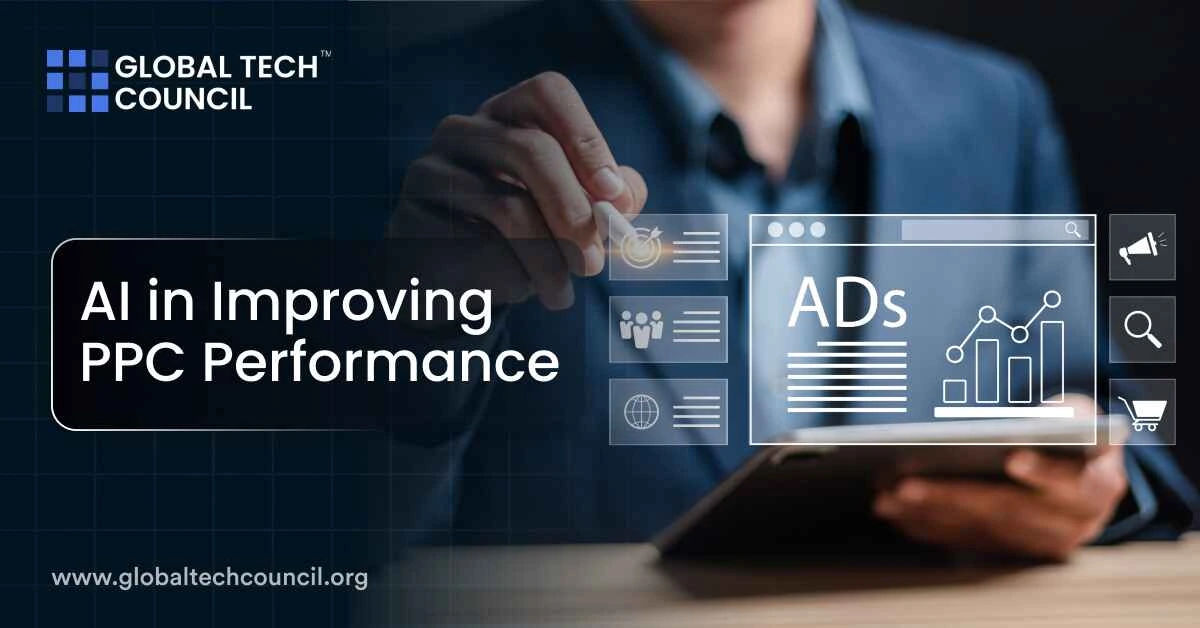Artificial Intelligence (AI) has brought a lot of changes to Pay-Per-Click (PPC) advertising, making it faster and more precise. By handling repetitive tasks, examining large sets of information, and fine-tuning campaigns instantly, AI helps marketers achieve outstanding results without requiring constant manual effort.
What AI Means for PPC
AI refers to software that can perform tasks often associated with human thinking, such as analyzing, learning, and solving issues. In PPC advertising, AI simplifies tasks like adjusting bids, designing ads, and targeting audiences, enabling marketers to focus on creative and strategic goals.
Improving PPC performance often requires a deeper understanding of AI. The CAIE Certified Artificial Intelligence (AI) Expert® certification helps you gain the expertise needed to harness AI effectively.
Smarter Bid Adjustments with AI
Managing bids effectively is a big part of running successful PPC campaigns. AI systems analyze ongoing data to tweak bids, ensuring ads appear in the right places while staying within budget. For example, Google’s Smart Bidding system uses machine learning to optimize bids based on potential conversions. It evaluates factors like device type, user location, and time to improve campaign results.
Better Ads Using AI
Capturing audience attention requires creative and impactful ad content. AI tools can quickly create and test multiple ad versions to find what works best. For instance, Google’s Responsive Search Ads allow advertisers to input various headlines and descriptions. AI then picks combinations that perform well with specific audiences.
In late 2024, Google integrated its Imagen 3 AI into its advertising platform, enabling automated creation of high-quality visuals. These tools make it easier for marketers to produce eye-catching imagery, helping campaigns connect better with viewers and drive action.
Pinpointing the Right Audiences
AI makes audience targeting more accurate by studying user habits, preferences, and demographic details to identify groups most likely to engage. This technology sorts through massive amounts of data, uncovering trends and patterns that help deliver ads tailored to individual interests.
Crafting the right prompts can make AI tools significantly more effective in PPC. Becoming a Certified Prompt Engineer™ equips you with the skills to optimize AI-driven campaigns.
On-the-Spot Campaign Tweaks
One of AI’s standout features is its ability to optimize campaigns as they run. Regularly monitoring performance allows AI to keep ads effective, even as market trends change. For instance, AI can pause ads that aren’t performing, adjust budgets toward successful ones, and refine strategies instantly, making every dollar count.
Keeping Tabs on Competitors
Keeping an eye on competitors is crucial for staying ahead in the game. AI simplifies this by analyzing competitors’ bidding habits, ad messaging, and targeted keywords. This knowledge helps marketers tweak their strategies promptly, ensuring they stay competitive in the market.
Streamlining Reports and Analysis
AI improves reporting by collecting and summarizing information from different platforms. This saves marketers time and helps them focus on actionable insights. For example, AI tools can highlight performance trends or unexpected changes, enabling quick, informed decisions for campaign improvements.
Recent Innovations in AI for PPC
In October 2024, Adobe launched GenStudio for Performance Marketing, a tool designed to speed up advertising workflows. It covers everything from planning and creating content to tracking and improving campaigns. Adobe also expanded its collaborations with platforms like Google, Meta, Microsoft, and TikTok, allowing advertisers to activate and fine-tune campaigns quickly across different channels.
AI development is at the core of creating innovative PPC solutions. The Certified Artificial Intelligence (AI) Developer® credential ensures you have the technical skills to build tools that drive success.
Challenges to Keep in Mind
However, while AI has many advantages, it also presents challenges. A key issue is safeguarding user privacy, as AI depends heavily on large data sets to function well. Marketers must pick reliable platforms that prioritize strong security practices and follow data protection laws.
Another challenge is that AI systems aren’t perfect. They need human supervision to ensure campaigns stay on track. Marketers should regularly review performance data and refine their approaches, blending AI’s speed with human creativity and critical thinking.
Final Thoughts
AI has transformed PPC advertising by automating processes, improving audience targeting, and optimizing campaigns instantly. However, marketers must combine AI’s strengths with hands-on oversight and address privacy concerns to get the most out of this technology.
